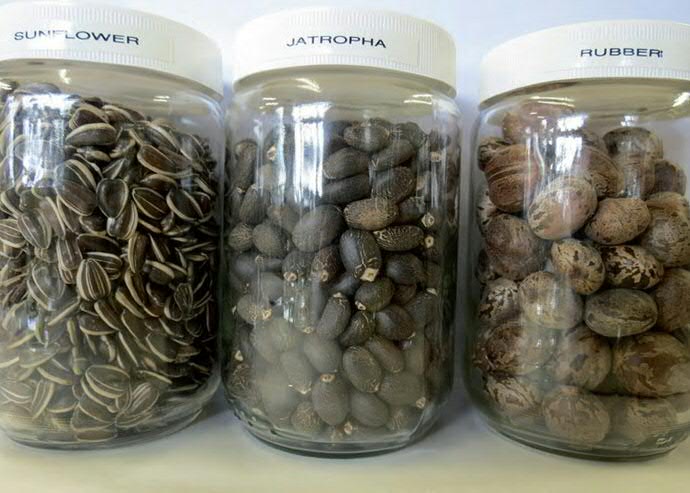Rubber tree as source of oil

Oil can be produced from the seeds of the rubber tree, a low-grade waste product found on plantations. Smallholders in Indonesia can use the oil in generators, but it could also be converted into biodiesel or bioplastic. These conclusions were drawn by Yusuf Abduh from the Department of Chemical Engineering at the University of Groningen, on the basis of laboratory experiments and field tests. He will defend his PhD thesis at the University of Groningen on 27 February.
Rubber trees produce seeds once or twice a year. The seeds are 30 percent oil and currently used as fodder for livestock or simply discarded. Yusuf Abduh tried to find out whether this oil could be extracted and used, based on previous experience in producing oil from jatropha nuts.
Power generator
Abduh’s work shows that the oil is of the same quality as other plant-based oils. The seeds were tested in an expeller under different conditions. Abduh was able to extract approximately three-quarters of the oil from the seeds by adding a tiny amount of ethanol. Ethanol is also needed for the next step, if the crude oil is converted into biodiesel.
Alternatively, the oil can be used in a stationary motor, for example a power generator for supplying energy, without further processing. Converting rubber oil into polymers, which form the raw material for thermohardeners, such as epoxy resins for use in adhesives, is another option.
Diesel production
Developing a continuous process for converting rubber oil into biodiesel was an important part of Abduh’s work. This process involves adding a catalyst to oil and ethanol in a reaction drum to convert it into biodiesel and glycerol. Abduh worked out the optimum conditions for this process in the Continuous Centrifugal Contactor Separator (CCCS) reactor, which is a type of centrifuge.
He then optimized the diesel production in a reactor that contained several hundred millilitres. The system produced a continuous flow of good quality biodiesel. The process now needs to be scaled up in a larger reactor, with the capacity to produce one litre of biodiesel per minute.
Economically feasible
The feasibility of extracting oil and converting it into biodiesel was also tested on a larger scale in Kalimantan, Indonesia, where 1,200 kilos of rubber seeds were collected for a field test. It proved possible to extract oil and convert it into biodiesel under realistic conditions.
Based on the experiments, field tests and model calculations, Abduh concluded that rubber seed oil could be produced for approximately 43 eurocents per litre. Although the margins of uncertainty are substantial, the price is comparable with that of subsidised diesel in Jakarta. As the price is higher in the inland areas of Kalimantan, extracting oil on rubber plantations would appear to be economically feasible.
Mobile demonstration unit
According to Abduh’s supervisor, Erik Heeres, the next step is to build a demonstration unit for producing rubber seed oil and biodiesel. ‘It would have to be mobile so that it can travel around the plantations producing oil for conversion into biodiesel after the seeds have fallen.’ In Heeres’s opinion, the research shows that extracting oil can be profitable on small rubber plantations. ‘Even if they only use the crude oil to generate their own power.’
Department of Chemical Engineering
Muhammad Yusuf Abduh’s thesis is entitled Biobased products from rubber, jatropha and sunflower oil. He carried out his research in the Department of Chemical Engineering of the University of Groningen, and was supervised by Professor Erik Heeres. Heeres’s research group focuses on biorefinery: converting organic matter into high-grade raw materials or products.
Abduh’s PhD project is part of the ‘Agriculture beyond Food’ research programme, run by the WOTRO Science for Global Development division of the Netherlands Organisation for Scientific Research (NWO) and the Royal Netherlands Academy of Arts and Sciences (KNAW), in which various universities and research institutes are taking part.
More information:
Prof. H.J. Heeres, Department of Chemical Engineering, University of Groningen.
| Last modified: | 04 December 2020 2.11 p.m. |
More news
-
08 October 2025
Not all plastic needs to be bio-based or biodegradable
Per person, we throw away about 33 kilos of plastic packaging per year. Professor of Polymer Chemistry Katja Loos is working on a more sustainable future for plastics - by looking at more than the material itself.
-
06 October 2025
The GenAI-bubble will burst, but don’t give up on AI altogether
'People keep promoting the belief that generative AI provides universal tools that are capable of much more,’ says Michael Biehl, Professor of Machine Learning. ‘Sooner or later, the genAI bubble will burst,’ he is certain. But that doesn’t mean all...
-
01 October 2025
In Science Podcast: Ajay Kottapalli about seal whiskers and ultrasensitive sensors
'In Science' is the podcast of the University of Groningen. In this episode, we’re joined by Ajay Kottapalli, Associate Professor at the Engineering and Technology Institute Groningen and co-founder of the Sencilia startup.
